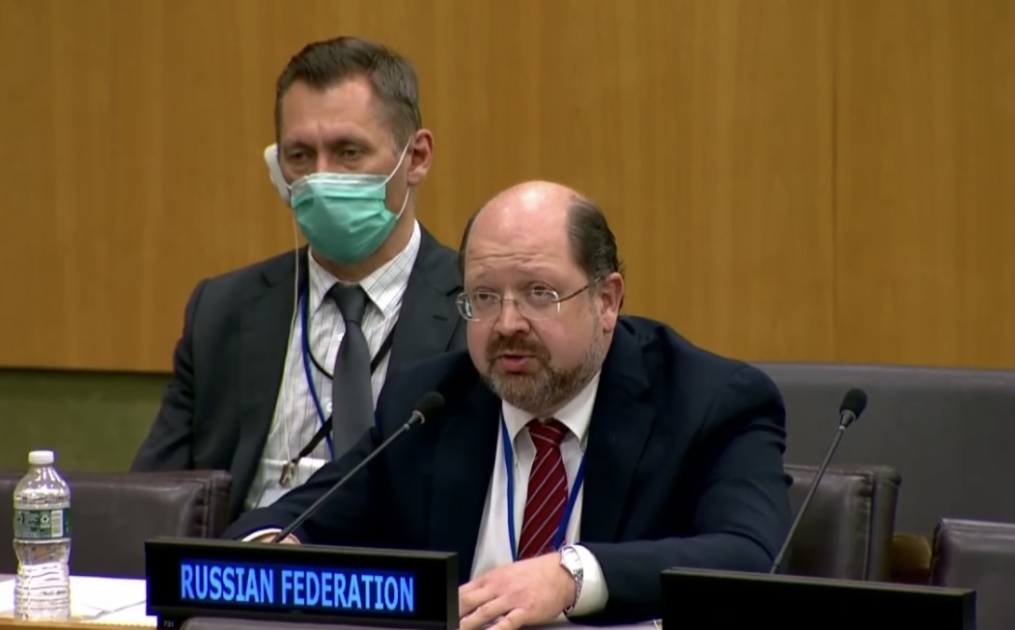Statement by Special Representative of the Ministry of Foreign Affairs of the Russian Federation for Human Rights, Democracy and the Rule of Law G.Lukiantsev in the Third Committee of the 76th Session of the UN General Assembly at the time of adoption of draft resolution “Combating Glorification of Nazism, neo-Nazism and Other Practices That Contribute to Fuelling Contemporary Forms of Racism, Racial Discrimination, Xenophobia and Related Intolerance” (A/C.3/76/L.57/Rev.1)
Mr. Chairman,
This year we mark an important milestone – 75 years since the Nuremberg Tribunal pronounced its Judgement. The verdict of the Tribunal in 1946 legally consolidated victory over Nazism and once and for all resolved the question of who represented the forces of good and who represented the forces of evil during World War II. The verdict, together with the establishment of the UN, marked the victory of the civilized world over National Socialism. It was the victory over racial supremacy and human hatred. Never before have States, divided by ideological and political differences, become united in the face of a common threat. The countries of the anti-Hitler coalition who called themselves the United Nations set an example for us to follow while searching for common solutions to global challenges.
The victory in World War II helped shape the contemporary system of promotion and protection of human rights. Such international legal instruments as the Universal Declaration of Human Rights, the International Covenants on Human Rights and, undoubtedly, the International Convention on the Elimination of All Forms of Racial Discrimination were the reaction of the United Nations to the crimes of Nazism and the policy of complete disregard for human dignity.
However, despite these obvious facts, we have once again witnessed attempts to deny our shared history. The draft resolution touches upon common human rights issues that we have faced almost every day. Moreover, since the adoption of a similar document last year the existing issues have not only remained unresolved, but have continued to worsen in many aspects. Against the backdrop of the coronavirus pandemic, racist and xenophobic rhetoric has gained momentum and calls to banish migrants and “foreign elements” have become louder.
And what is to be done about the wars waged against monuments to the fighters against Nazism and fascism? And what about the annual marches of Nazi supporters? Why are torch marches honoring active Nazi collaborators and accomplices to their crimes held every year in the center of Europe? How can we describe the situation when new memorials are being unveiled to those who fought for or collaborated with Hitler's Germany by committing war crimes and crimes against humanity? Why symbols and emblems long associated with the victory over Nazism are being banned by a number of countries instead of honoring the heroic liberators?
Mr. Chairman,
The co-sponsors of the draft resolution consider it totally unacceptable that those involved in the crimes of Nazism, including white washing of the former SS and Waffen-SS members recognized as criminal by the Nuremberg Tribunal, should be glorified.
At the same time, those who fought against the anti-Hitler coalition or collaborated with Nazis are increasingly hailed as national heroes and heroes of national liberation movements. And this happens in Europe of all places, Europe that has felt the effects of National Socialism as no one else has. The same phenomenon is also observed in the countries occupied by Nazis during World War II whose heroic peoples made a major contribution to the defeat of Nazism.
Conversely, there had been objections that it is not a violation of international obligations of States to protect human rights, but quite the opposite – the practical implementation of the right to freedom of peaceful assembly and expression.
We are convinced that it is not an example of political correctness or manifestation of the freedom of speech, but an attempt to falsify and rewrite the history of World War II. However, we are not only entitled, but we are obliged to be proud of that history. What we see is blatant cynicism and blasphemy with respect to those who had freed the world from the horrors of National Socialism. Moreover, these are criminally punishable acts, as stipulated in article 4 of the International Convention on the Elimination of All Forms of Racial Discrimination.
Mr. Chairman,
The co-sponsors are convinced that the adoption of the draft resolution with the broadest possible support of Member States would contribute enormously to efforts aimed at eliminating racism, racial discrimination, xenophobia and related intolerance.
The adoption of the draft resolution is a duty not only towards those who had founded the United Nations, but also towards the succeeding generations they had sought to forever save from the scourge of war.
